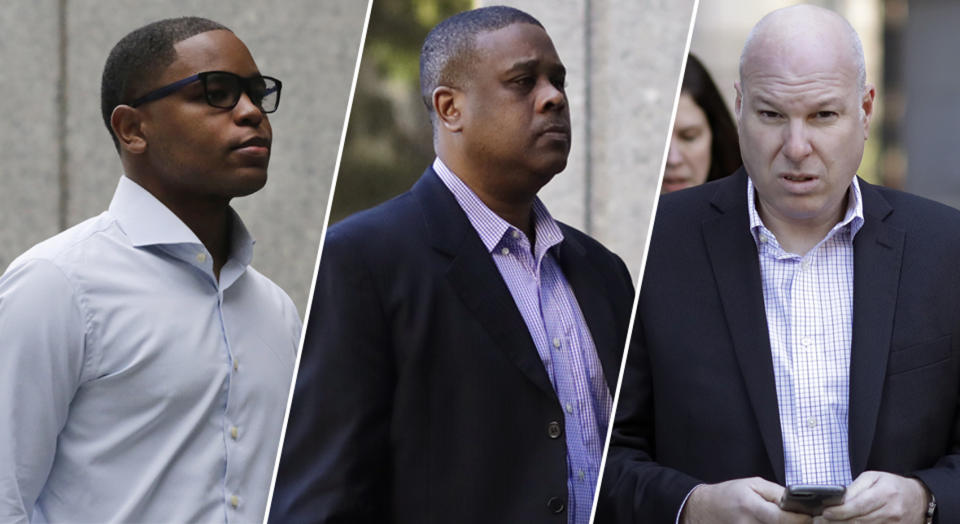After hoops corruption trial verdict, how much will college basketball's most powerful man shake up the sport?
The most powerful man in college basketball this winter is not a Hall of Fame coach, future lottery pick or even whatever administrator seeds the NCAA tournament field.
He’s an impeccably dressed, Yale-educated, 38-year-old assistant U.S. attorney from Manhattan, where he’s shaken up the sport by leading the federal prosecuting team that delivered convictions to three men in the college basketball fraud trial.
Now, Edward “Ted” Diskant can decide just how far he wants to try to take this case. And college basketball can wonder what comes next if he does.
A jury Wednesday found Adidas executives Jim Gatto and Merl Code and basketball middleman Christian Dawkins guilty on all counts of wire fraud and conspiracy to commit wire fraud for paying the families of top high school recruits and steering them to preferred, Adidas-sponsored colleges.
That required Diskant’s team, which included Noah Solowiejczyk, Eli Mark and Aline Flodr, to successfully argue the colleges being sent five-star recruits to help win them games and make them money were actually somehow victims, not benefactors.
Most who know the wink-and-nod nature of the sport found the theory dubious, but the government made it work. Now everyone in basketball is wondering if it means anyone who has done anything that theoretically rendered a player ineligible hasn’t likewise broken federal fraud statutes.
A February trial is already scheduled for former NBA star and Auburn assistant Chuck Person and co-defendant Rashan Michel, an Atlanta clothier. An additional trial featuring Code, Dawkins and three former college assistants – Tony Bland (USC), Lamont Evans (Oklahoma State) and Emanuel “Book” Richardson (Arizona) – is set to begin in April.

The U.S. Attorney’s Office can choose to try those cases, which would bring additional waves of potential NCAA violations involving an untold number of schools and coaches to become public. Or it could offer, especially considering the position of strength Wednesday’s convictions provide, plea deals and possibly conclude this without further effort, sparing plenty of secrets.
At any point, it can permit the NCAA to start investigating and use the mountains of evidence collected in the case. While much was heard in court over the past month, there was even more – wiretaps, under-oath allegations, documents – that wasn’t included because it didn’t fit the prosecution or was denied admission by Judge Lewis A. Kaplan.
The U.S. Attorney’s Office could also attempt to flip any or all of the people still involved and go after even more prominent names – potentially including the prominent head coaches who have thus far escaped prosecution.
At this point, there is no one in basketball that doesn’t respect, if not outright fear, the U.S. Attorney’s Office for the Southern District of New York.
“Ted is in the driver’s seat right now, there is no question,” said one attorney involved in the case. “This could be the end, or this could be the beginning.”
The most significant target for cooperation would be Dawkins, the 25-year-old aspiring agent who found himself in the middle of endless recruiting and agent selection deals. He knows, as they say, where the bodies are buried and could help this case reach all sorts of unexpected locales.
Dawkins, however, could be impossible to crack. He has thus far rejected all attempts to get him to flip and he may prefer to do his time with a certain dignity.
“Christian was offered the opportunity to testify against others and elected not to,” said Dawkins’ attorney, Steve Haney, on Wednesday. “He can hold his head high knowing he faced his own actions and fought the merits of the allegations.”
Dawkins is not the only weapon here, though. Both Gatto and Code also are facing sentencing. Plus, the government already owns cooperation agreements with T.J. Gassnola, a connected AAU team director and so-called Adidas “bag man” who may have a wealth of information on college programs. Financial planner Munish Sood also testified in this case under a cooperation agreement and suggested on the stand knowledge of years of agent-related payouts to players.
How many others would roll when contacted, especially now with the government owning a high-profile victory and a March 5 sentencing date for Gatto, Code and Dawkins, right on the eve of the NCAA tournament?
There is no telling how big this could get … if the Southern District wants to make it big, or at least a lot bigger than two mostly anonymous shoe company employees and a streetwise, overambitious hustler. College fans mostly yawned at that.
That decision won’t rest solely, or even mostly, with Diskant. He has bosses, but they sure sounded pleased with his work on Wednesday.
“The defendants not only deceived universities into issuing scholarships under false pretenses, they deprived the universities of their economic rights and tarnished an ideal which makes college sports a beloved tradition by so many fans all over the world,” said Deputy U.S. Attorney Robert S. Khuzami.
Basketball fans can roll their eyes at that sentiment of who is and isn’t a victim, or how beloved the ideal of amateurism really is, but if the Department of Justice truly cares about such things, well, there are plenty more perpetrators out there waiting to be prosecuted.
And Ted Diskant can probably do it, quite easily now.
More from Yahoo Sports:
• Report: NFL admits it missed crucial helmet hit on QB
• Mike Oz: Dodgers need a whole lot more than Machado
• Broncos send backup QB packing after arrest
• Jeff Passan: How Game 1 personified self-aware baseball

